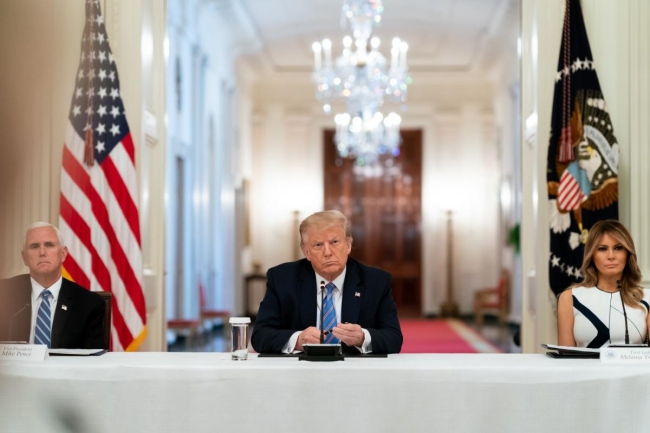You have /5 articles left.
Sign up for a free account or log in.

President Trump, First Lady Melania Trump and Vice President Mike Pence listen during National Dialog on Safely Reopening America's Schools event.
White House, Andrea Hanks
The Trump administration has stopped short of saying it wants to withhold funding from colleges and universities that do not reopen for the fall term, as President Trump and Education Secretary Betsy DeVos have threatened with K-12 schools.
But some higher education lobbyists are concerned the administration’s push to get students back into classrooms could make it harder to get funding in Congress’s next coronavirus aid package to help colleges deal with the financial hit they’re taking from the pandemic.
When the Senate returns next week from its July 4 break, Congress will begin racing to reach a deal on the next aid package in three weeks before leaving again until after Labor Day.
Lobbyists are concerned that the focus will be on limiting aid for colleges only to help them reopen, which would be a blow to institutions that are dealing with lost revenues and additional costs, as well as significant cuts in state funding in many states.
“The concern is that with all the focus on reopening, it’s going to take up all the air in the room,” said Jessica Thompson, an associate vice president at the Institute for College Access & Success. “There’s a dire need for funding right now for schools to reopen. They need the money ASAP.” But the need goes beyond the costs of reopening, she said.
And there might be reason for concern. In a statement on Wednesday, Senator Lamar Alexander, the Republican chair of the Senate's education committee, did not explicitly say he'd be opposed to funding colleges beyond the cost of reopening. But asked about the upcoming package, he tied additional aid to reopening and echoed the administration's argument that reopening classrooms is what's best for young people.
“Congress should provide new federal funding to help all public and private schools and colleges open safely this fall. We should also give states new funding to distribute to those schools and colleges that incur additional expenses because of meaningful plans to open safely with students physically present in classrooms,” he said. “The American Academy of Pediatrics says ‘all policy considerations for the coming school year should start with a goal of having students physically present in school.’”
However, any package would need the support of some Democrats to be able to pass the Senate, as well as the acceptance of the Democratic House. And both are pushing for a broader aid package.
“That’s going to be the political tension,” Thompson said.
Costs of Reopening
The American Council on Education, a group of presidents representing colleges and universities, estimated the cost for institutions nationwide to reopen safely would be $74 billion. ACE had previously asked for $46.6 billion to soften the financial blow to institutions. In conversations with lawmakers, the group is sticking to asking for the lower figure.
At the high end of the upcoming negotiations is a $430 billion education and childcare proposal from Senator Patty Murray, the top Democrat on the education committee, and Senator Chuck Schumer, the Senate Democratic leader. Colleges would receive $132 billion in aid to cover both the cost of reopening and to help with the financial hardship many institutions face.
Without more federal aid, college students might have to drop out, “widening disparities that disproportionately harm students of color, specifically Black students,” Murray and Schumer said in a statement.
In addition, Murray and Schumer's proposal would deal with some problems that stemmed from the CARES Act, including prohibiting DeVos from excluding undocumented students from receiving emergency aid to help with living expenses during the pandemic. Murray joined Representative Bobby Scott, the House education committee chairman, and Representative Rosa DeLauro, chairwoman of the House education appropriations subcommittee, on Tuesday in protesting that exclusion in a letter to DeVos. The Democrats wrote the decision was "wrong and unauthorized."
The Democratic majority in the House, meanwhile, is proposing a massive $3 trillion in additional aid in the HEROES Act, a figure Republican senators have scoffed at. The bill only includes, however, $27 billion to states to spend on higher education, as well as another $10 billion that would go directly to public and nonprofit institutions.
It remains to be seen what Trump and Senate Republicans propose next week. In a statement last Friday, Judd Deere, a White House spokesman, said the administration is open to providing funding to help colleges reopen.
"If Disney World can be open so can our schools," he said, "and this Administration will work in partnership to provide the resources and guidance needed for higher education institutions as well as local school districts to do that."
Deere declined to comment Tuesday on whether the administration would go beyond that to help soften the financial toll of the pandemic on colleges. Deere was also vague last week when asked if Trump’s threats to penalize schools that held only online courses applied to higher education. Trump had referred to campuses in a tweet last Friday, in which he called students learning online “TERRIBLE.”
“Not only does the president want to see schools open but so do teachers, students, parents and health professionals, but if unions and misguided local leaders are going to hold schools hostage, putting our children’s mental and social development in jeopardy, President Trump is not going to waste taxpayer dollars,” Deere said after the tweet last week.
Though not as overtly as the threats he and DeVos have made to K-12 schools that do not think it’s safe to reopen, Trump has been putting pressure on colleges to resume in-person classes. Although the Department of Homeland Security rescinded it Tuesday, the agency' s policy announced last week prohibiting international students from returning to or remaining in the United States this fall if the colleges they attend adopt online-only instruction models was seen as a push for campuses to reopen.
And in a second tweet on Friday, Trump also threatened to have the Treasury Department explore ways to pull the tax-exempt status of colleges and universities, which he said focus on “Radical Left Indoctrination, not Education.”
Limiting Federal Aid
Lobbyists said the administration couldn’t remove higher education’s tax exemption unilaterally, but they read the threat as part of the pressure being applied by the administration for colleges to reopen.
"The president believes liberals don't want to reopen the country to hurt him," Terry Hartle, the American Council on Education’s senior vice president for government and public affairs, said last week.
During a meeting with Louisiana college presidents Tuesday, Vice President Mike Pence didn't give indications of what the administration envisions in the next bill. Rather, he and DeVos spoke of the aid included in the CARES Act and alluded to the possibility that more money might be coming, said Thomas Galligan, interim president of Louisiana State University at Baton Rouge, who attended the meeting.
Senate Republicans haven’t threatened to penalize colleges that do not reopen. But Senate Majority Leader Mitch McConnell has said he wants to keep down the cost of the next package, which would include a number of components, including continuing to give larger unemployment benefits in some fashion.
Alexander voiced support for giving colleges more money to reopen in an interview last month on CNBC’s Squawk Box.
Congress should make sure the nation’s schools and colleges “have the money they need to open safely in the fall,” he said. “I mean, the surest step back toward normalcy in our country is when 70 to 75 million college and high school and elementary school students go back to school. They need to go back. Their parents need for them to go back. And the economy needs for them to go back. So if we need more money for that, I'm for that.”
At the same time, conservative groups oppose any additional aid funding for colleges, which Mary Clare Amselem, an education policy analyst for the conservative think tank the Heritage Foundation, referred to as a “bailout” in a recent interview.
To Amselem, the financial pressures of the pandemic should push colleges to refocus on academics, after institutions have been spending money on social goals and putting up new buildings and athletic facilities.
Noah Weinrich, a spokesman for the group’s political arm, Heritage Action, said a bigger focus for conservative lawmakers is opposing more aid to states and local governments, which colleges support to forestall billions in cuts to higher education. But, Weinrich said, "I don't think conservatives will want more aid to colleges without conditions like cutting costs or tuition."
However, lobbyists said they haven’t heard talk of limiting aid to colleges with large endowments, after Trump and DeVos sharply criticized colleges like Harvard University for accepting CARES Act funding.
Neither Deere nor the Education Department would comment when asked if they want to limit wealthier colleges from getting aid. A spokeswoman for Senator Josh Hawley, who proposed limiting the ability of colleges with large endowments from getting coronavirus funding, said the Missouri Republican is still pushing the idea. "Relief needs to be targeted towards those desperately in need, not wealthy, elite colleges,” said the spokeswoman, Kelli Ford.
Still, other senators, including Senator Pat Roberts, a Republican from Kansas, are supportive of additional aid for higher education.
“As a proud graduate of K-State, I support our public schools and universities,” he said in a statement. “As Congress debates another coronavirus aid package, we will carefully look at ways to help our hurting institutions that are vital in preparing the next generation’s workforce.”
Craig Lindwarm, the Association of Public & Land-grant Universities’ vice president of government affairs, said in a statement, "Institutions face tremendous expenses to reopen in as safe a manner as practically possible. These costs are on top of massive losses over the spring and summer, and for public institutions, they come as steep state cuts are hitting. It’s important that federal funding be flexible so institutions can adapt such resources to the unique challenges faced by their campuses."
David Baime, the American Association of Community Colleges' vice president for government relations and policy analysis, said, "It is unfortunate that the complicated and difficult issue of how colleges should deliver courses this fall has taken on political overtones. Having said that, I think there remains a strong recognition across Congress that colleges and universities need significant financial support from the federal government in order to be able to best serve their students. I think the politics of the issue fall away when the realities confronting students and colleges are faced."
Meanwhile, Senate Republicans also haven’t released details of their proposal to shield businesses, as well as colleges, from coronavirus-related lawsuits. Republicans have said it is a must-have in order to pass another aid package. But Democrats, including Murray, as well as education unions like the American Federation of Teachers, strongly oppose the idea.
Advocates for student loan borrowers, meanwhile, also are unsure whether Congress will extend a moratorium in the CARES Act, excusing student loan borrowers from having to make monthly payments, interest-free, until Sept. 30.
The advocates, including Kyle Southern, higher education policy and advocacy director for the Young Invincibles, a millennial advocacy group, were disappointed that House Democrats at the last minute limited student debt relief in the HEROES Act only to economically distressed borrowers. And Senate Republicans have rejected the idea of canceling student debt.
On Wednesday, 101 civil rights groups, including Americans for Financial Reform and Young Invincibles, wrote congressional leaders urging the next package to expand on the House Democrats' proposal by wiping out $30,000 of student debt for all borrowers, regardless of income.
However, Senate Democrats during the debate over the CARES Act had proposed that the federal government make monthly student loan payments on behalf of borrowers so their balances would be reduced by at least $10,000. Murray said in a statement she’ll push to extend the moratorium on payments and to reduce student debt in the next aid bill.
“We need to extend this relief through the pandemic and help borrowers make progress in actually reducing the amount they owe,” she said. “This crisis is long from over for student loan borrowers -- so I will continue fighting to reduce their debt burden in future COVID relief legislation, including writing down balances and providing forgiveness for our public servants and frontline workers.”








